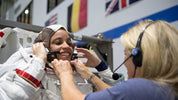
Dr. Jessica Watkins Makes History As First Black Woman Astronaut To Join NASA's International Space Station Crew
, by Veracity Savant , 3 min reading time

, by Veracity Savant , 3 min reading time
She's traveling to space for six months!
Dr. Jessica Watkins is making history as the first Black woman astronaut to join the NASA Space Station crew, The New York Times reports.
Watkins earned her undergraduate degree from Stanford University and her doctorate from the University of California, studying landslides on Mars and Earth. Since then, she has worked on several NASA science labs projects, including the Mars Curiosity rover mission, eventually joining NASA's astronaut corps in 2017.
"[Becoming an astronaut was] something I dreamed about for a very long time ever since I was pretty little, but definitely not something I thought would ever happen," Watkins said.
In 2020, she became one of 18 astronauts named by NASA to represent the agency's Artemis program, a multibillion-dollar initiative to return humans to the moon's surface in 2025. The first trip to the moon was made up of all white men. The Artemis program will send the first woman and first melanated person to the moon; NASA has been intentionally diversifying its programs.
For months, Watkins has been training for a trip to space, completing spacewalk simulations at NASA's Johnson Space Center in Houston, and learning the intricacies of the space station, a science lab 260 miles above earth that's the size of a football field. Now, NASA has announced that Dr. Watkins will join the Space Station crew, making history as the first Black woman astronaut to do so.
“It is certainly not lost on me that we’ve arrived in this moment in history,” she said of being the first Black woman to carry out a long-duration mission. “This moment is not as worthwhile if we are not able to focus on the job and perform well.”
On the mission, Watkins will serve as a mission specialist on SpaceX's next astronaut flight, also known as Crew-4. She, alongside two other NASA astronauts and an Italian astronaut, will embark on a six-month mission beginning this April.
The geologist spoke about the historic moment, saying she hopes her journey will set an example for other children of color.
"Particularly young girls of color, to be able to see an example of ways that they can participate and succeed. For me, that's been really important, and so if I can contribute to that in some way, that's definitely worth it," said Watkins.
Of the 249 people who have boarded the space station since its inception more than 20 years ago, only seven have been Black. Victor Glover, a Navy commander and test pilot who joined the NASA astronaut corps in 2013, made history as the first Black crew member in an extended duration mission at the station, beginning last year. Before that, the other six Black astronauts were only visiting as part of the space shuttle crews that stayed for about 12 days.
In 1961, Ed Dwight, an Air Force pilot, became NASA's first Black astronaut but was not selected to travel to space. Then, in 1983, Guion S. Bluford made history as the first Black American to travel to space, followed by Mae Jemison becoming the first Black woman to head to space in 1992. Then earlier this year, Sian Proctor, a geologist and Arizona educator, was chosen to become a member of SpaceX's Inspiration4, an amateur astronaut mission that traveled to orbit. Proctor made history as the first Black woman to serve as a spacecraft pilot.
Watkins is hopeful that her work will open even more doors for future Black astronauts, and she is excited to excel while on the mission at the Space Station.
"It is certainly not lost on me that we've arrived in this moment in history. This moment is not as worthwhile if we are not able to focus on the job and perform well," she said.
Congratulations, Dr. Watkins! You're soaring to new heights!
Photo Courtesy of NASA/David DeHoyos